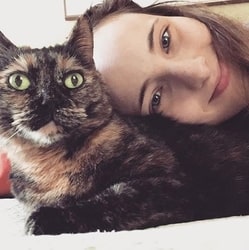
Cats are mysterious creatures — every cat owner knows this to be true. Among their many quirks is the tendency to meow while yawning. If you have wondered what it means when your cat exhibits this behavior, I have the full answers in this guide.
Cats have many different vocalizations, and we know what most of them mean.
However, animal behaviorists are still unsure as to why some cats meow while yawning.
If your cat meows while it yawns, it probably doesn’t mean anything. It is most likely just a physical reflex or a vocal stretch.
Cats are vocal by nature, and for some cats, this is a fact that only becomes more true as they age.
Although the meow is the most well-known noise that a cat produces, the vocalizations will vary depending on the cat and can range from squeaks to chirps to howls.
If your cat is meowing while it yawns, it’s possible that this is just a part of their unique communication package — it’s not too surprising that your cat has a few quirks, is it?
Is My Cat’s Yawning and Meowing a Sign of a Medical Problem?

Most of the theories for why cats meow when they yawn aren’t cause for concern, but if you notice it becomes an excessive pattern for your cat, there is the chance of an underlying medical problem.
This is especially true if your cat also has other symptoms such as bad breath or difficulty swallowing. If you have concerns about your cat’s behavior, a visit to the animal clinic is recommended. Your vet can examine your cat’s physical and dental health — the latter being especially important because often a yawn could indicate a problem with your cat’s teeth.
Why Cats Meow

It’s often been said that cats meow purely as a way to communicate with the humans in their lives — i.e., cats don’t meow to communicate with other cats. While this is certainly true for adult cats, it is not true for kittens, as baby cats are born with the innate ability to produce meows. They use this ability at length to communicate their needs to their mothers.
However, this reliance on meowing is short-live. Once a kitten becomes self-sufficient, communication between felines relies less on meows and more on chemical indicators and body language.
Of course, as humans, we cannot pick up on these subtle cues, and cats have clued into our inability to catch on to what they’re saying (or not saying). That’s where the meow comes in.
Thanks to years of sharing our spaces, cats have learned that humans understand meowing. In turn, they have learned that meowing is the perfect way to draw a human’s attention to an empty food pool or to protest an impromptu pick-up.
Generally speaking, cats meow to announce their disapproval, or to tell us that they need something from us — although that’s not all. Believe it or not, your cat has five different kinds of vocalizations, all distinct from one another.
Aside from the classic meow, you are probably also familiar with:
- Purring, which cats use to express contentment or to comfort themselves in times of distress
- Chirping, a playful noise that may very well mean that there are birds outside the window
- The hiss or growl, which means that your car is feeling threatened or on the defense.
Another fun fact: the amount your cat meows can also depend a lot on its breed.
Some breeds like Persians tend to be on the chattier side, while others like the Norwegian Forest Cat are known to hardly meow at all.
It will probably also come as no surprise to learn that the amount of meowing that your cat does can depend on its individual personality.
Apparently, there are five personality types usually seen in cats, from the “Human Cat” to the “Inquisitive Cat” (you can probably imagine what kind of attributes those personality types entail).
Why Cats Yawn
1, Tiredness

It’s no secret that cats seem to have an insatiable need for slumber. How could it be that, even with all of that shut-eye, they are still tired enough to yawn?
2, Bored
Just like humans, cats use body language as a way to express themselves. When your cat produces a yawn, it may not actually be that your cat is feeling tired. It could be that your cat is just bored, and not afraid to express it (sound familiar?)
3, Contentment

There are other reasons for cat yawns, too. If you notice your cat frequently yawning around you, there’s a chance that you could take it as a big compliment. According to some experts, a yawn is a sign that your feline friend is feeling deep contentment.
4, Fatigude and trying to stay awake
Of course, there is always the possibility that your cat is simply yawning out of fatigue. This may especially be the case if you notice that your cat’s yawns tend to follow any of their numerous naps throughout the day. On the contrary, your cat may actually be yawning to try to stay awake.
5, Gather more air
One other theory that attempts to explain cat yawns is the suggestion that they may be yawning to gather more carbon dioxide — however, this exact theory has been disproven to be the case in humans.
Can You Catch a Yawn From Your Cat? Can Your Cat Catch a Yawn From You?

Most humans can attest to the fact that they have “caught” a yawn from somebody else before, or that they have transferred a yawn to somebody else. It would be logical to assume that we also have the power to catch the yawns of our cats, and vice-versa.
However, there hasn’t been much scientific research done on whether or not yawns are contagious between species.
There was research done on whether or not dogs and humans can catch one another’s yawns, though, and it does seem to be the case. It could very well be that all mammals are capable of bringing out the need to yawn in one another.
So, when a cat opens their mouth to yawn but instead meows, are they attempting to send us a message that’s getting lost in translation? It’s possible, but we simply don’t know.
Sadly, there don’t appear to be any studies in progress that look at this particular subject either, which means that we may be left without answers for a while. If only our cats could tell us!

Read about me
Sources
- https://www.humanesociety.org/news/understanding-feline-friend
- https://www.merckvetmanual.com/cat-owners/digestive-disorders-of-cats/disorders-of-the-mouth-in-cats
- https://www.merckvetmanual.com/cat-owners/digestive-disorders-of-cats/disorders-of-the-mouth-in-cats
- https://www.aspca.org/pet-care/cat-care/common-cat-behavior-issues/meowing-and-yowling
- https://www.petmd.com/news/view/cat-language-101-how-do-cats-talk-each-other-37620
- https://www.hillspet.com/cat-care/behavior-appearance/distinct-cat-sounds-and-their-meanings
- https://moderncat.com/articles/12-sounds-cats-make-and-what-they-mean/
- https://www.petmd.com/news/view/which-personality-does-your-cat-have-35643
- http://www.vetstreet.com/cats/why-does-my-cat-yawn-so-much
- https://www.peta.org/living/animal-companions/feline-body-language-tip/
- https://www.pet-happy.com/why-is-your-cat-yawning-at-you-are-you-that-boring/
- https://www.mentalfloss.com/article/18587/why-do-we-yawn
- https://www.thenakedscientists.com/articles/questions/can-you-catch-yawn-cat